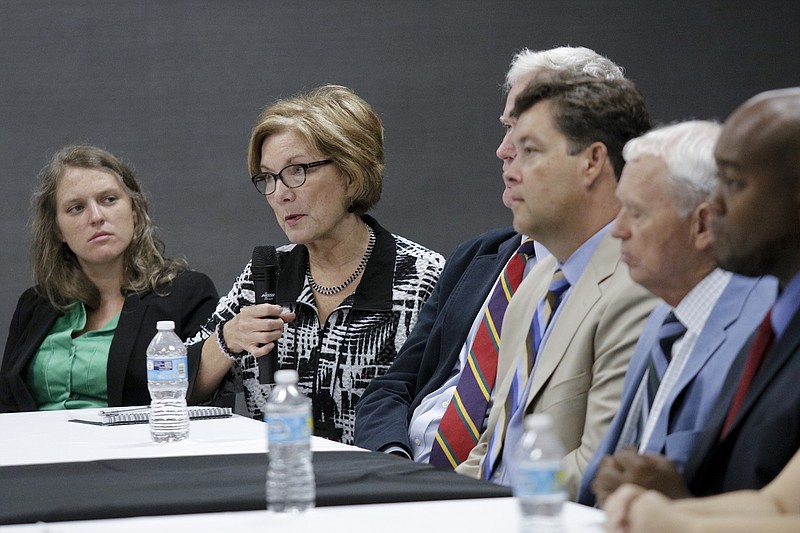Last week, four Hamilton County residents - all facing criminal charges - went into court looking for a new answer to an old problem: mental illness.
They came from different backgrounds. Some had found themselves entangled in the court system for the first time. Others had long been on probation.
Graduation requirements
A successful graduate should demonstrate: * Stability * Compliance with supervision * Participation in community * Engagement in ongoing therapeutic support * Means to obtain food, clothing and other daily needs* The ability to take medication as prescribed* The ability to remain drug-freeSource: Hamilton County Mental Health Court guidelines
But all wanted help with their mental illnesses. And all wanted to avoid the Hamilton County jails, already crowded with people facing mental conditions like theirs.
The four people were the first test cases for Hamilton County's new mental health court. The long-awaited program has been designed to slow what advocates call a "revolving door" of mentally ill jail inmates by offering them help instead of handcuffs.
In the new program, offenders will be eligible for reduced sentencing or parole as long as they commit to intensive mental health treatment and monitoring.
On Tuesday night at Parkridge Medical Center, a large panel of criminal justice leaders and mental health advocates unveiled plans for the court, which will begin July 30.
"This is a community response to a community need," said Anna Protano-Biggs, an assistant public defender who has been helping coordinate the effort. "At the end of the day, we are talking about people - people in our community."
Not only do advocates hope that the program will get repeat offenders much-needed treatment, but that it also will save taxpayer dollars.
The Hamilton County Jail and its sister facility at Silverdale have been dubbed default mental health institutions, with 40 percent of the roughly 1,500 people incarcerated in the jails on some kind of psychotropic medication. The county spent $68,800 on such drugs in 2013 alone.
Efforts to start a mental health court program have stalled in the past, but the current effort started gaining traction in 2013, when a Hamilton County grand jury called for the creation of such a court.
Since then, a large group of judges, attorneys, mental health advocates and law enforcement officers have collaborated to design the program. The group has looked to models like the well-established mental health court in Nashville.
Because of that program, Protano-Biggs said, recidivism among mentally ill offenders in Davidson County has plunged from 77 percent to 10 percent, while there has been a 51 percent reduction in arrests. The program so far has saved the state $500,000.
No additional funding has been provided for the court, or for the five local mental health organizations which are planning to assist in case management, though program leaders say they hope to get grant funding in the future.
Offenders getting treatment may have those costs paid for through TennCare or safety-net programs, or through traditional out-of-pocket means.
But advocates for the program said they weren't willing to wait on a large pile of funding to get the program started.
"Don't wait on the money," said Samantha Bales, another program director through the public defender's office, recalling advice the group received from other courts. "They told us, 'Do it with what you have in your community.' And that's what this group of folks has done."
HOW IT WORKS
In some ways, the program will be similar to drug court, with a regimen of treatment programs, screenings and progress checks.
To qualify for the court, offenders will have to meet a range of requirements. They must be a Hamilton County resident with a diagnosed mental illness, which is linked to their criminal charges. They must have some insight into their illness, be able to benefit from the treatment and volunteer for the program.
Finally, they must be a candidate for an alternative sentence, which typically means that they are not a violent offender.
Each participant's drug court plan will be different, tailored to their illness and health needs. But all will involve treatment and supervision, and all will have to show up for regularly scheduled status hearings before a judge.
In General Sessions Court, all five judges will take on a mental health docket. In Criminal Court, the program will be overseen by Judge Don Poole.
"Until I was on the bench, I did not realize the amount of people who were cycling through the criminal justice system with mental health problems," Poole said.
In addition, Bales said the court will help connect the participants with wraparound services like alcohol and drug treatment, housing, job skills training, and family therapy.
To graduate, participants will have to demonstrate that they are stable, and engaging in ongoing therapeutic support. They should be taking medication as prescribed; and staying drug-free.
For participants in Criminal Court, the program will last about two years. For those in Sessions Court, it will be about six months.
"At the end of the day, the goal is to empower these people to live their lives as freely as possible," Bales said.
Contact staff writer Kate Harrison Belz at kbelz@timesfreepress.com or 423-757-6673.

